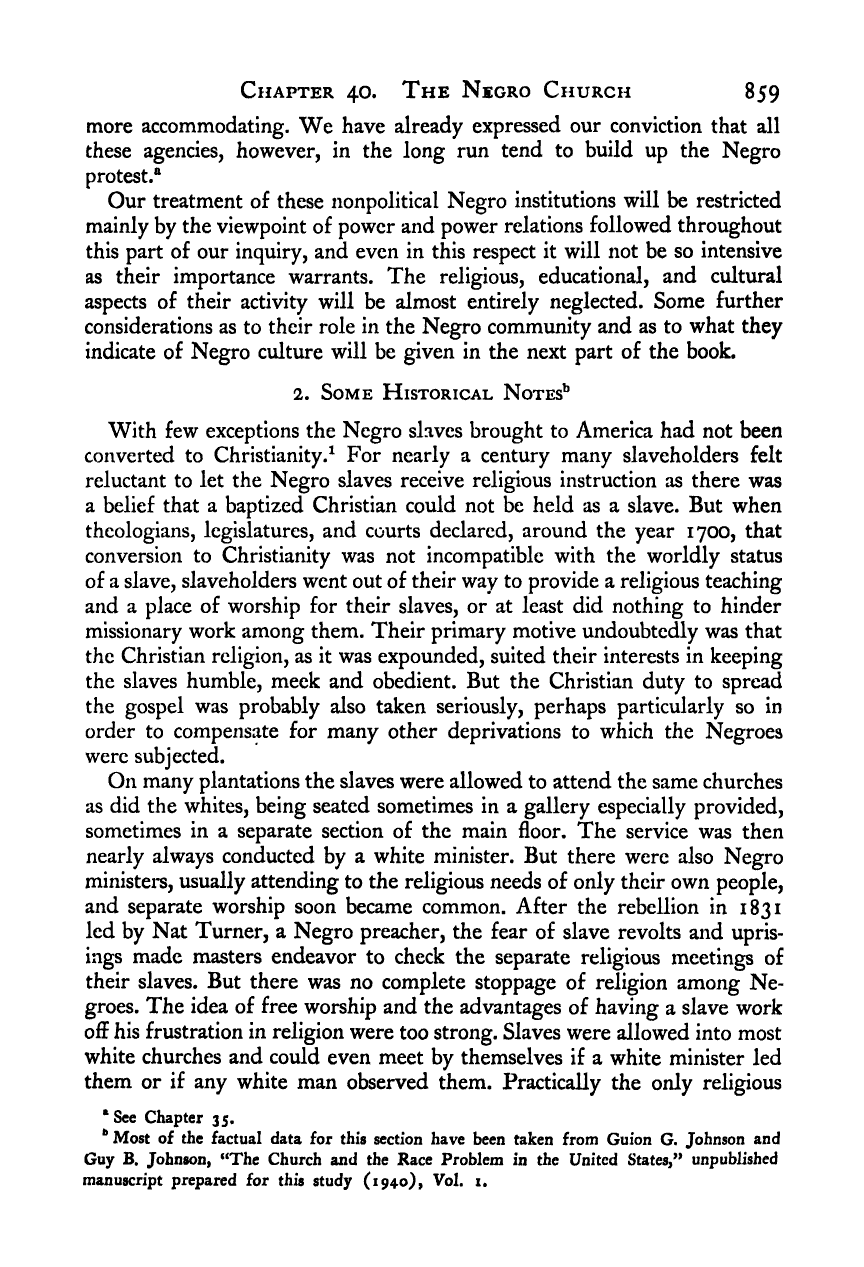Note: Gunnar Myrdal died in 1987, less than 70 years ago. Therefore, this work is protected by copyright, restricting your legal rights to reproduce it. However, you are welcome to view it on screen, as you do now. Read more about copyright.
Full resolution (TIFF) - On this page / på denna sida - IX. Leadership and Concerted Action - 40. The Negro Church - 1. Non-Political Agencies for Negro Concerted Action - 2. Some Historical Notes

<< prev. page << föreg. sida << >> nästa sida >> next page >>
Below is the raw OCR text
from the above scanned image.
Do you see an error? Proofread the page now!
Här nedan syns maskintolkade texten från faksimilbilden ovan.
Ser du något fel? Korrekturläs sidan nu!
This page has never been proofread. / Denna sida har aldrig korrekturlästs.
Chapter 40. The Negro Church 859
more accommodating. We have already expressed our conviction that all
these agencies, however, in the long run tend to build up the Negro
protest.*^
Our treatment of these nonpolitical Negro institutions will be restricted
mainly by the viewpoint of power and power relations followed throughout
this part of our inquiry, and even in this respect it will not be so intensive
as their importance warrants. The religious, educational, and cultural
aspects of their activity will be almost entirely neglected. Some further
considerations as to their role in the Negro community and as to what they
indicate of Negro culture will be given in the next part of the book.
2. Some Historical Notes’*
With few exceptions the Negro slaves brought to America had not been
converted to Christianity.^ For nearly a century many slaveholders felt
reluctant to let the Negro slaves receive religious instruction as there was
a belief that a baptized Christian could not be held as a slave. But when
theologians, legislatures, and courts declared, around the year 1700, that
conversion to Christianity was not incompatible with the worldly status
of a slave, slaveholders went out of their way to provide a religious teaching
and a place of worship for their slaves, or at least did nothing to hinder
missionary work among them. Their primary motive undoubtedly was that
the Christian religion, as it was expounded, suited their interests in keeping
the slaves humble, meek and obedient. But the Christian duty to spread
the gospel was probably also taken seriously, perhaps particularly so in
order to compensate for many other deprivations to which the Negroes
were subjected.
On many plantations the slaves were allowed to attend the same churches
as did the whites, being seated sometimes in a gallery especially provided,
sometimes in a separate section of the main floor. The service was then
nearly always conducted by a white minister. But there were also Negro
ministers, usually attending to the religious needs of only their own people,
and separate worship soon became common. After the rebellion in 1831
led by Nat Turner, a Negro preacher, the fear of slave revolts and upris-
ings made masters endeavor to check the separate religious meetings of
their slaves. But there was no complete stoppage of religion among Ne-
groes. The idea of free worship and the advantages of having a slave work
off his frustration in religion were too strong. Slaves were allowed into most
white churches and could even meet by themselves if a white minister led
them or if any white man observed them. Practically the only religious
* See Chapter 35.
**
Most of the factual data for this section have been taken from Guion G. Johnson and
Guy B, Johnson, “The Church and the Race Problem in the United States,” unpublished
manuscript prepared for this study (1940), Vol. i.
<< prev. page << föreg. sida << >> nästa sida >> next page >>